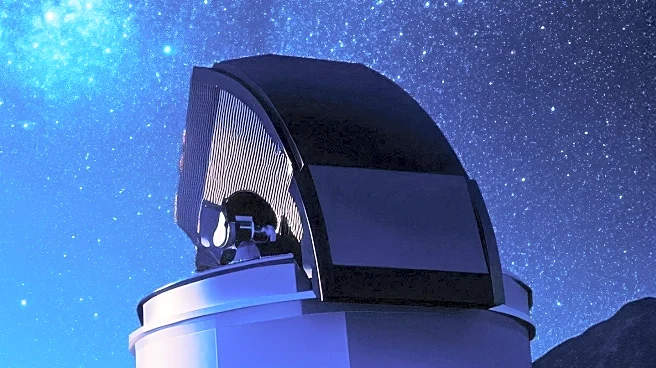What's Happening?
Great Basin National Park, located in eastern Nevada, is renowned for its exceptionally dark skies, making it an ideal location for stargazing and astronomical research. The park, which is situated within the Great Basin region, is home to the Great Basin Observatory, the first research-grade observatory built in a U.S. National Park. The observatory, located at an elevation of 6,825 feet, features a 27.5-inch reflecting telescope and other advanced equipment, allowing for significant astronomical observations, including studies of binary stars and exoplanets. The park's remote location, high elevation, and dry climate contribute to its clear, dark skies, free from significant light pollution. The park also hosts regular ranger-led astronomy programs and an annual astronomy festival, emphasizing its commitment to dark sky preservation.
Why It's Important?
The preservation of dark skies at Great Basin National Park is crucial for both scientific research and public education. The park's observatory plays a vital role in advancing astronomical studies, contributing valuable data to NASA and other scientific endeavors. By maintaining its dark sky status, the park supports ongoing research into celestial phenomena, which can have broader implications for understanding the universe. Additionally, the park's educational programs and festivals raise public awareness about the importance of reducing light pollution, encouraging conservation efforts. This not only benefits scientific research but also enhances the visitor experience, allowing people to connect with the natural night sky in a way that is increasingly rare in modern society.
What's Next?
Great Basin National Park will continue to promote its dark sky resources through ongoing educational initiatives and public events. The park's annual astronomy festival, held in mid-September, will likely draw visitors interested in experiencing the pristine night sky. The observatory will persist in its research activities, potentially expanding its collaborations with educational institutions and scientific organizations. Efforts to minimize light pollution in and around the park will remain a priority, ensuring the preservation of its dark skies for future generations. Stakeholders, including park officials and conservation groups, may advocate for broader policies to protect dark sky areas across the United States.
Beyond the Headlines
The emphasis on dark sky conservation at Great Basin National Park highlights broader environmental and cultural issues related to light pollution. As urban areas expand, natural dark skies are becoming increasingly scarce, impacting ecosystems and human health. The park's initiatives serve as a model for balancing development with environmental preservation. Culturally, the ability to observe a clear night sky connects people to historical and ancestral experiences, fostering a sense of wonder and curiosity about the universe. The park's efforts underscore the importance of preserving these experiences in an age of technological advancement.









